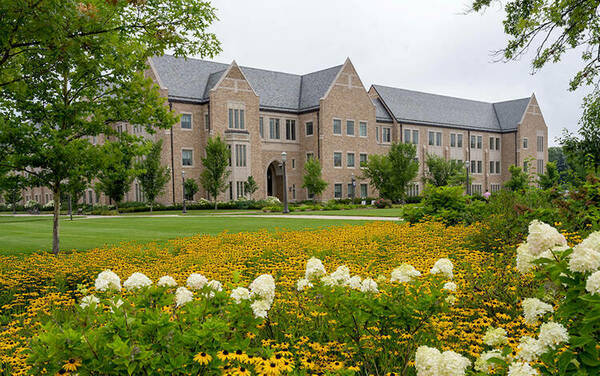
The University is building a new kind of support team to work alongside principal investigators throughout the research lifecycle.
“If you’re a researcher, a growing list of grants and projects is a great thing. It means more funding and more resources. But it also means more tasks to manage and more rules to comply with — especially since the regulatory landscape is always changing,” Nicole Quartiero said. “As researchers’ portfolios grow, they often find a need for additional resources to support and sustain that growth. Previous approaches may no longer be effective at this stage.”
That is why Notre Dame Research recently added a team to offer customized support and help to facilitate the research administration processes. And Quartiero, who joined in May 2022, leads the team as Notre Dame’s first-ever director of research project management.
The RPM team is part of Notre Dame Research’s larger operations and facilities team led by Melanie DeFord, assistant vice president for research. DeFord explained that “new ideas and groundbreaking discoveries require an array of administrative and operational tasks. These include procuring equipment, staffing a lab, storing and managing data, gaining approvals and complying with regulations, just to name a few.
The RPM team brings a wealth of added skill to the research team. Research project managers can facilitate these tasks to ensure they are done and done well — while keeping the administrative burden as far as possible from the researchers, and keeping the projects on schedule.”
How the RPM team helps researchers
Quartiero said that the mention of “project management” may conjure up images of Gantt charts, process maps and RACI matrices. But the RPM team focuses not on a set of tools but on “getting things done.” “We never say ‘I don’t know’ or ‘that’s not my job,’” she said. “If we encounter something we truly cannot do, we will find someone who can. Faculty members are subject matter experts in their field of research. RPMs complement that expertise with their expertise in research administration and their can-do attitudes.”
Quartiero offered a few examples of when a researcher might seek out support from a research project manager.
“Maybe a PI received a new award and needs to hire or set up infrastructure. Or maybe they are unfamiliar with new rules or reporting systems,” she said. “They don’t need to suffer in silence. We are available to give them as much or as little help as they want. We bring an array of options and let them pick what level of support would help remove the unwanted noise from their research.”
The RPM team can be hired at any point during a research project’s lifecycle. But Quartiero said it is best to engage the team at the proposal development and planning stage when possible.
“Working with us from the beginning means it might be possible to integrate the RPM team directly into a proposal plan — and to define the scope and costs early on,” she said. “Regardless of the stage you think you will need the RPM team’s support, the best results come from engaging with the team early and often.”
A trusted delegate
One RPM recently filled the gaps and helped a PI rehire when he lost a key staff member. Another stepped in to help when a researcher was dealing with an issue related to sub-award funding with partner universities.
Recently, Michael Ferdig, a professor in Notre Dame’s Department of Biological Sciences, sought help from the RPM team when a big grant deadline was looming.
“It was down to the wire,” he said. The mood was “very tense and it took a heroic effort from a lot of folks.”
He said of his RPM, Katie Cybulski: “She is truly ‘gold’ to me for her knowledge of all the moving parts and ability to connect with folks … to keep the hundreds of pieces flowing from various institutions and PIs into the final document.”
For Quartiero, these examples show that the key to a RPM’s work is trust.
“In order for us to remove PIs’ worries, we have to act as their delegate,” Quartiero said. “And that’s really about trust. It’s not something we build by following just one process. We build it by meeting PIs where they are and by making their unique needs and challenges our own.”
Quartiero said the best way to request help from the RPM team is to email ndrpm@nd.edu. A member of the team will reach out to schedule an introduction and a feasibility discussion.
Originally published by at ndworks.nd.edu on May 15, 2023.




